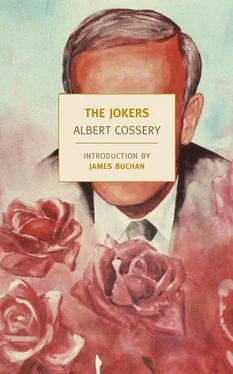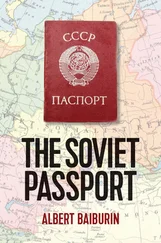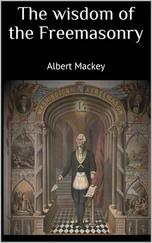From time to time, his eyes fell on one of the posters he’d put up the night before in anticipation of today’s walk. Strewing his path with pictures of the governor had seemed brilliant then, when he’d been filled with the delighted anticipation of today’s walk, but now he regretted having anything to do with this hideous thing that accosted him with every step, like a billboard from hell. The posters made him sick; it was all too depressing. Already a few of them had fallen victim to local vandals, with eyes scratched out or a beard scribbled in. These perfidious flourishes hadn’t ruined the governor completely; he was still recognizable. Since the appearance of the posters, he’d become as famous as a movie star. Even children cursed him, like the villain of an action film. But that didn’t bother the authorities in the least; what bothered them was when crowds gathered around to look and laugh, peppering their laughter with jibes and snide asides. More than once the police had to intervene, arresting a few individuals who were laughing especially loudly, charging them with public drunkenness. Which was, come to think of it, more or less true. And then there were always two or three hash smokers around, and for them the governor’s picture triggered explosions of transcendent glee. Nothing could temper their hysterical outbursts — not even the billy clubs of the policemen, who were furious to see the effects of drug use spreading to contaminate the lives of clean-living citizens, who no doubt were stunned by such unmerited praise of the governor but still maintained appearances as best they could. These bouts of collective hilarity — which would spring up at the most inopportune moments, sometimes causing traffic jams — were putting the authorities to the test. The government’s henchmen waited dejectedly, utterly confounded by the treacherous initiative, which seemed unworthy of real revolutionaries and bordered on being a hoax.
Karim stopped abruptly. A few meters ahead, under the shade of one of the trees lining the avenue, a traveling barber had set up with his tools. Karim wondered if he should get his hair cut. Suddenly it seemed vital that he appear well-groomed when presenting himself to the authorities, so that they would recognize the esteem in which he held them. A haircut was essential: long hair suggested the tortured spirit of a bitter revolutionary. And his scruffy neck and sideburns — not respectable. What a serious mistake he’d almost made! How would they know he’d reformed when he had a mop on his head befitting a dirty intellectual? A good haircut — an almost shaved head, like a convict’s — that would make the right impression! That would be concrete proof of his loyalty! And only one man could perform this miracle: this ignorant barber, with his clippers of mass destruction.
Karim sauntered up, delighted with his decision.
The barber was in the midst of shaving an earnest young man wearing a dark, tattered suit, with a morose expression and an air of dignified poverty. He sat on a wooden stool with his back pressed against a tree and his eyes closed, and the impression he made was one of exquisite agony. On his knees was a paper folder on which he had laid his threadbare tarboosh, the distinctive sign of a public servant — he looked like he was afraid of being dragged into the surrounding human scum. The barber squatted and, with the meticulous gestures of an embalmer preparing a corpse, shaved his customer’s cheeks with a razor so old and broken that it rasped like a power saw. Karim’s arrival didn’t disturb them at all; neither of them answered his greeting. Surprised, but as confident as ever of his plan, he sank down on the second stool the barber provided for waiting clients. Right away he felt a subtle change in the atmosphere, filling him with an incredible happiness, irresistibly nudging him little by little toward sleep. The cool shade and the scent of the shaving soap mingled with the violet perfume of various oils and tonics were like the sweet air of the countryside. It was hot as a furnace, but the barber’s spot — though still outdoors — was a garden of delights, a place to draw you into dreams. Karim would have liked to stay as long as possible, motionless, only half-conscious as people swirled about, writhing like the damned in the eternal fire. He was still savoring this exquisite respite when he was brutally torn from his torpor by a donkey cart coming to a screeching halt at the curb. The driver leaped to the ground, unhitched his donkey, and, grabbing it by the neck, hauled it into the shade practically right under Karim’s nose.
“Master Abadou,” the driver croaked, “are you going to be done soon? This son of a bitch needs grooming!”
“Right away,” the barber responded, tossing a glance at the four-legged client. “Just a minute, and I’ll take care of him.”
The donkey, either out of vanity or because he understood that they were talking about him, started to bray without interruption, which Karim found very disagreeable. After a moment of this, the young man couldn’t restrain himself from addressing the driver:
“Does it bray like that all the time, or is it his birthday?”
“He’s hot,” said the driver. “He’s an old donkey, but a good one.”
The driver was a fat brute, incapable of appreciating sarcasm. Karim was deeply pained; he’d hoped for a wittier reply. Faced with his interlocutor’s intellectual paucity he looked put out, saying:
“I’m sure he is. But try anyway to make him shut up. It’s unbearable!”
The driver patted the donkey on the back, soothing it like a mistress with tender words, promising it unheard-of heaps of alfalfa. In response to these false vows, the donkey gradually calmed down and began to chew at the air. By this time the barber had finished with his client, who donned his tarboosh and slipped away, folder under his arm, aware that an altercation was brewing. Clearly he didn’t want to be implicated in a fight over a donkey.
Master Abadou grabbed his clippers and approached the donkey with the nervous look of an artist finally taking on his great subject. But before he could get to work, Karim stopped him with a gesture and stood up from his stool.
“What’s this, man! I was here first. And I’m in a hurry!”
“Excuse me, effendi,” said the driver. “But he’s a regular, I can’t make him wait.”
“He’ll wait. I’m telling you: I’m in a hurry.”
“This donkey is in a bigger hurry than you, young man,” said the driver.
“Why?” said Karim. “Is he going to a wedding?”
“We don’t have time for weddings,” came the driver’s grandiloquent reply. “We work!”
The donkey started braying again, as if proud of the prerogative he enjoyed. Singing sweetly to nobody, the barber ran the clippers along his back. Karim, though only feigning indignation, was increasingly exercised by the care that was being lavished on the donkey. What was this beast? A government donkey — a minister, perhaps, traveling incognito to gain insight into his subjects’ state of mind? That wouldn’t be at all surprising, given the exceptional treatment he was enjoying at the barber’s hands. What a crazy situation! Karim had gotten trapped in a maze and he’d have to find a clever way out that wasn’t going to cause too much damage. But he couldn’t leave, just like that, without making some kind of scene — abandoning such a fertile terrain just waiting for the seeds of conflict to be sown. This could be his only chance all day to have some fun.
He lifted his cuff, pretending to check the watch on his wrist, and addressed the barber once more:
“Do you realize, man, I have a meeting with the governor. And you’re making me wait behind a donkey!”
“Which governor?” said the driver, as if frankly stunned to learn of the existence of such a person.
Читать дальше












